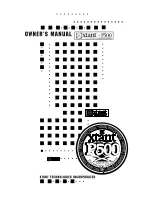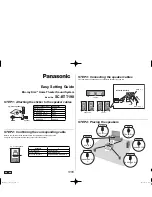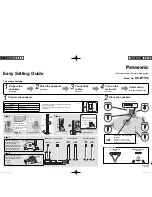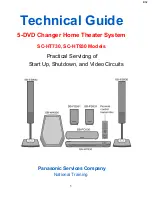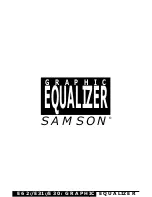
3
This appliance is classified as a CLASS 1 LASER product. The
CLASS 1 LASER PRODUCT MARKING is located on the rear
exterior.
Laser component in this product is capable
of emitting radiation exceeding the limit for
Class 1.
CAUTION
Use of controls or adjustments or performance of procedures
other than those specified herein may result in hazardous radiation
exposure.
Notes on chip component replacement
• Never reuse a disconnected chip component.
• Notice that the minus side of a tantalum capacitor may be
damaged by heat.
Flexible Circuit Board Repairing
• Keep the temperature of soldering iron around 270˚C
during repairing.
• Do not touch the soldering iron on the same conductor of the
circuit board (within 3 times).
• Be careful not to apply force on the conductor when soldering
or unsoldering.
NOTES ON HANDLING THE OPTICAL PICK-UP
BLOCK OR BASE UNIT
The laser diode in the optical pick-up block may suffer electrostatic
break-down because of the potential difference generated by the
charged electrostatic load, etc. on clothing and the human body.
During repair, pay attention to electrostatic break-down and also
use the procedure in the printed matter which is included in the
repair parts.
The flexible board is easily damaged and should be handled with
care.
NOTES ON LASER DIODE EMISSION CHECK
The laser beam on this model is concentrated so as to be focused on
the disc reflective surface by the objective lens in the optical pick-
up block. Therefore, when checking the laser diode emission,
observe from more than 30 cm away from the objective lens.
MODEL IDENTIFICATION
— BACK PANEL —
TABLE OF CONTENTS
1. SERVICE NOTE
······························································· 4
2. GENERAL
·········································································· 5
3. DISASSEMBLY
································································ 7
4. TEST MODE
···································································· 12
5. MECHANICAL ADJUSTMENTS
····························· 16
6. ELECTRICAL ADJUSTMENTS
······························· 16
7. DIAGRAMS
7-1.
Circuit Board Location ····················································· 21
7-2.
Block Diagrams ································································ 22
7-3.
Printed Wiring Board – BD Section – ······························ 24
7-4.
Schematic Diagram – BD Section – ································· 25
7-5.
Printed Wiring Board – Main Section – ··························· 26
7-6.
Schematic Diagram – Main (1/3) Section – ····················· 27
7-7.
Schematic Diagram – Main (2/3) Section – ····················· 28
7-8.
Schematic Diagram – Main (3/3) Section – ····················· 29
7-9.
Printed Wiring Board – Power AMP Section –
(BX7 model) ····································································· 30
7-10. Schematic Diagram – Power AMP Section –
(BX7 model) ····································································· 31
7-11. Printed Wiring Board – Power AMP Section –
(DX7, DX7J model) ························································· 32
7-12. Schematic Diagram – Power AMP Section –
(DX7, DX7J model) ························································· 33
7-13. Printed Wiring Board – Panel Section – ··························· 34
7-14. Schematic Diagram – Panel Section – ····························· 35
7-15. Printed Wiring Board – Leaf SW Section – ···················· 36
7-16. Schematic Diagram – Leaf SW Section – ························ 37
7-17. Printed Wiring Board – Driver Section – ························· 38
7-18. Schematic Diagram – Driver Section – ···························· 39
7-19. Printed Wiring Board – Trans Section –
(BX7 model) ····································································· 40
7-20. Schematic Diagram – Trans Section –
(BX7 model) ····································································· 41
7-21. Printed Wiring Board – Trans Section –
(DX7, DX7J model) ························································· 42
7-22. Schematic Diagram – Trans Section –
(DX7, DX7J model) ························································· 43
7-23. IC Pin Function Description ············································· 44
7-24. IC Block Diagrams ··························································· 46
8. EXPLODED VIEWS
8-1.
Main Section ····································································· 49
8-2.
Panel Section ···································································· 50
8-3.
Main Board Section ·························································· 51
8-4.
Tape Mechanism Section ·················································· 52
8-5.
CD Mechanism Section ···················································· 53
9. ELECTRICAL PARTS LIST
······································· 54
PARTS No.
• Abbreviation
CND : Canadian model
AUS
: Australian model
G
: German model
EA
: Saudi Arabia model
MY
: Malaysia model
SP
: Singapore model
TH
: Thai model
KR
: Korea model
MX
: Mexican model
AR
: Argentina model
E2
: Central and
South AMERICA
E3
: Middle and Near East
MODEL
AED, AEP, CIS, UK, G, AUS,
KR, MX, TH models
AR, E, EA, SP, TW, MY models
US, CND models
DX7J model
PARTS No.
4-225-040-1
s
4-225-040-2
s
4-225-040-3
s
4-228-592-3
s





















